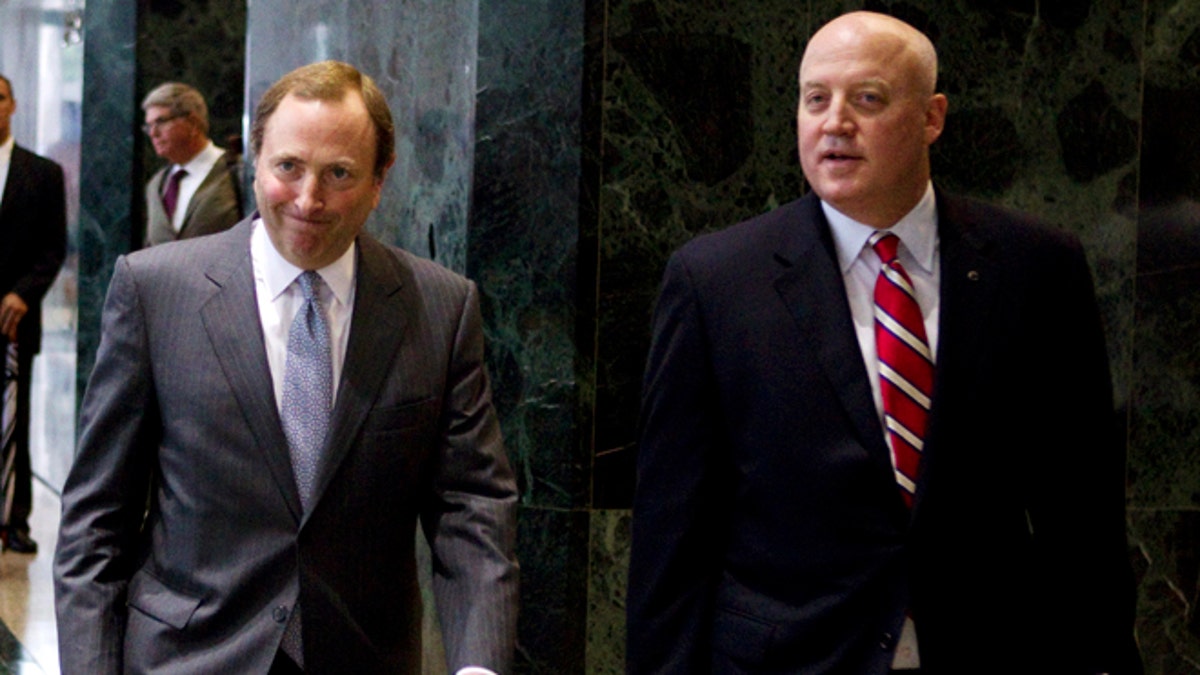
Aug. 14, 2012: This file photo shows NHL commissioner Gary Bettman, left, and Bill Daly, deputy commissioner and chief legal officer, following collective bargaining talks in Toronto. (AP/The Canadian Press)
NEW YORK – Lots of questions, but still no answers in the NHL labor fight.
The league and the players' association spent much of Saturday talking to each other via conference call. The conversations were strictly for the purpose of sharing information regarding the new contract offer the NHL made to the union late Thursday. The initial thought was that the sides would get together Sunday in New York to hold official negotiations for the first time in weeks, but those hadn't been scheduled as of late Saturday afternoon.
"Some more informational sessions in the morning," NHL deputy commissioner Bill Daly told The Associated Press regarding Sunday. "Nothing planned beyond that."
The union pored over the latest NHL proposal aimed at ending the lockout that reached its 105th day Saturday and saving the delayed hockey season. The league would like to reach a deal no later than Jan. 11, which would allow training camps to start the following day, and a 48-game season to begin Jan. 19.
Saturday's conference calls were scheduled Friday night so the union could ask league officials questions about the nearly 300-page proposal. Whether enough progress will be made to lead to face-to-face talks remains to be seen.
The sides haven't gotten together since Dec. 13 with federal mediators. Bargaining sessions with only the NHL and union involved haven't been held since Dec. 6, when talks abruptly ended after the players' association made a counterproposal to the league's previous offer. The league said that offer was contingent on the union accepting three elements unconditionally and without further bargaining.
The NHL then pulled all existing offers off the table. Two days of sessions with mediators the following week ended without any progress made.
The players' association's executive board and negotiating committee went over the new proposal during an internal conference call Friday.
A person familiar with key points of the offer told The Associated Press that the league proposed raising the limit of individual free-agent contracts to six years from five -- seven years if a team re-signs its own player; raising the salary variance from one year to another to 10 percent, up from 5 percent; and one compliance buyout for the 2013-14 season that wouldn't count toward a team's salary cap but would be included in the overall players' share of income.
The person spoke on condition of anonymity because details of the new offer weren't being discussed publicly.
The NHL maintained the deferred payment amount of $300 million it offered in its previous proposal, an increase from an earlier offer of $211 million. The initial $300 million offer was pulled off the table after negotiations broke off earlier this month.
The latest proposal is for 10 years, running through the 2021-22 season, with both sides having the right to opt out after eight years.
The lockout has reached a critical stage, threatening to shut down a season for the second time in eight years. All games through Jan. 14, plus the Winter Classic and the All-Star game already have been called off. The next round of cuts could claim the entire schedule.
The NHL is the only North American professional sports league to cancel a season because of a labor dispute, losing the 2004-05 campaign to a lockout. A 48-game season was played in 1995 after a lockout stretched into January.
It is still possible this dispute could eventually be settled in the courts if the sides can't reach a deal on their own.
The NHL filed a class-action suit this month in U.S. District Court in New York in an effort to show its lockout is legal. In a separate move, the league filed an unfair labor practice charge with the National Labor Relations Board, contending bad-faith bargaining by the union.
Those moves were made because the players' association took steps toward potentially filing a "disclaimer of interest," which would dissolve the union and make it a trade association. That would allow players to file antitrust lawsuits against the NHL.
Union members voted overwhelmingly to give their board the power to file the disclaimer by Jan. 2. If that deadline passes, another authorization vote could be held to approve a later filing.
Negotiations between the NHL and the union have been at a standstill since talks ended Dec. 6. One week later, the sides convened again with federal mediators in New Jersey, but still couldn't make progress.
The sides have been unable to reach agreement on the length of the new deal, the length of individual player contracts, and the variance in salary from year to year. The NHL is looking for an even split of revenues with players.








































